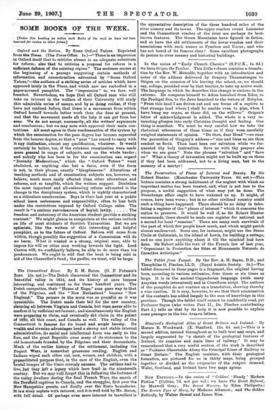In the series of "Early Church Classics" (S.P.C.K., le. 6d.)
we havo Orion the Teacher. This little volume contains a tranalsa tion by the Rev. W. Metcalfe, together with an introduction and notes of the address delivered by Gregory Thaumaturgus to Origen on the occasion of his leaving the school, or, we should say, college, presided over by that teacher, to take up active work. The language in which he describes this change is curious in the extreme. He compares himself to Adam banished from Eden, to the Prodigal Son, to the Jews banished to the waters of Babylon. "From this land I am driven out and am borne off a captive to that strange land where I shall be unable even to pipe, when I have hung my organ, as those did, on the willows." Origen's letter of acknowledgment is added. The whole is a very in- teresting glimpse into early Christian thought and feeling. One thing is manifest. We must be very careful how we take the rhetorical utterances of these times as if they were carefully weighed statements of opinion. "Do thou, dear Head "—so runs the peroration of Gregory's address—" rise and bless us are thou sendest us forth. Thou hast been our salvation while we fre- quented thy holy instruction. Save us with thy prayers also when we are gone." Note the phrases "salvation" and "Save us." What a theory of invocation might not be built up on these if they had been addressed, not to a living man, but to the memory of a martyr !
















































 Previous page
Previous page